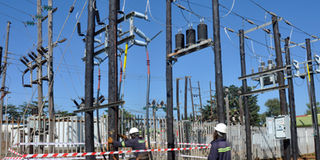What will raise household electricity demand?

Engineers carryout mechanical works at Layibi substation in Gulu town. The private sector hopes to increase domestic electricity demand through appliance financing. PHOTO BY TOBBIAS JOLLY OWINY
For years now, Uganda’s domestic electricity demand has been meagre. Domestic electricity demand is electricity used at home.
Most of the electricity generated is consumed by industrialists who when combined utilise more than half of the electricity generated.
In 2018, Umeme collected Shs438b from 640.4Gigawatt hours (GWh) of electricity consumed by domestic users compared to a total of Shs921b from all industrialists who consumed 2002.6GWh during the same period.
The need for increased growth in domestic demand for electricity is now more than ever apparent as Uganda’s generation capacity is this year expected to hit the 2000 megawatt (MW) ceiling.
Increased generation capacity is informed by the highly anticipated commissioning of 600MW Karuma dam and other mini hydro dams in the pipeline.
However, domestic electricity demand is not moving as fast.
Reliability
As a result, government has formulated the National Energy Policy Bill currently in draft stage, amending the 2002 law to bolster domestic demand.
Among the priority areas and strategic interventions, government highlights the need to increase access to reliable, affordable and modern energy services.
Lack of reliability of power amongst those with access to electricity has affected demand, pushing people to use alternative sources of energy.
To avert unreliable power, government hopes to expand transmission and distribution infrastructure towards increasing reliable electricity access.
In addition, enforcing strictly punitive measures against theft and vandalism of energy infrastructure is expected to boost reliability.
Economic empowerment
However, when talking about access and productive usage of power, the concept of affordability cannot be forgotten.
According to a recently concluded study undertaken by Voluntary Action for development, a non-government organisation, domestic demand for electricity is stifled by poverty.
Many of the respondents engaged said they could not afford electricity because they were earning low income.
“The communities all said that the electricity is becoming more expensive every day and this is affecting their usage. In Kiwuunya, the focus group discussions established that one of the main reasons these people are engaging in illegal connections is because of the high costs yet they earn less and have many basic needs to meet. This was similar in Kiyaaye,” the report conducted in three zones of Nakulabye, Kampala reads in part.
As a result, communities must be economically empowered in order for them to sustainably afford electricity and increase access to grid power beyond 25 per cent.
However, government has hope in the free Electricity Connections Policy which seeks to increase access to over 300,000 households annually.
Appliance financing
The private sector is testing out a different model.
“We know that in order to achieve 100 per cent access in Uganda will cost government about $10b, that is over 27 per cent of the country’s Gross Domestic Product (GDP) and it is not sustainable,” Ms Sumaya Mahomed, director Power for All in Uganda says.
A coalition including, but not limited to Umeme, Makerere University, the Rockefeller Foundation and Power for All have rolled out a pilot test dubbed “Utilities 2.0” to test new ways of accelerating energy access, stimulating customer demand and improving grid performance.
Testing out the pilot in areas of Kiwumu, Nyenge and Namasubi villages of Mukono district, Utilities 2.0 will establish whether appliance financing can accelerate productive use of electricity.
“We are looking at a viable business model. Can the decentralised community which is good at simulating demand, develop the customer and integrate with the grid and hand over a profitable customer to the utility,” she noted.
In addition, one of the programme’s objectives implemented by EnerGrow, one of the partners, is appliance financing which will offer appliances to communities on credit.
The move is expected to boost productive use of electricity.
“The loan is about six to 18 months depending on the size of the loan with monthly payments,” Mr Angus Marjoribanks, chief operating officer, EnerGrow says.



